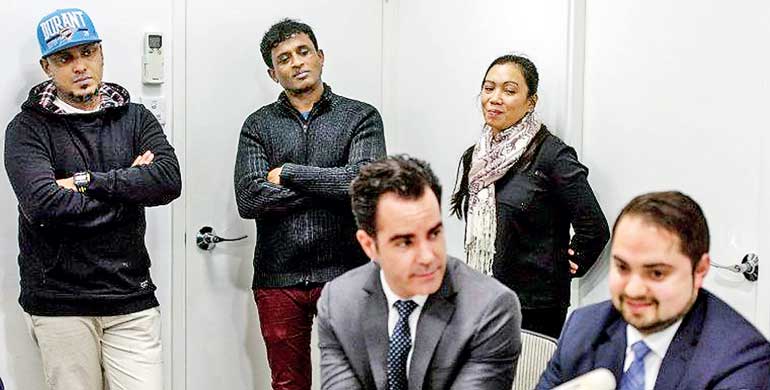Monday Feb 23, 2026
Monday Feb 23, 2026
Friday, 10 March 2017 00:00 - - {{hitsCtrl.values.hits}}
 Lawyers Francis Tourigny (front C) and Marc-Andre Seguin (front R), speak during a press conference attended by their clients, Sri Lankan asylum seekers Kellapatha Supun Thilina (L), Debagma Kankanalamage Ajith Pushpa Kumaralistens (back C) and Filipino Vanessa Rodel. (Photo: AFP
Lawyers Francis Tourigny (front C) and Marc-Andre Seguin (front R), speak during a press conference attended by their clients, Sri Lankan asylum seekers Kellapatha Supun Thilina (L), Debagma Kankanalamage Ajith Pushpa Kumaralistens (back C) and Filipino Vanessa Rodel. (Photo: AFP
AFP: Refugees who sheltered fugitive whistleblower Edward Snowden in Hong Kong are formally seeking asylum from the Canadian government as their lawyers said Thursday their lives are in danger.
The impoverished refugees living hand to mouth in the city took in the former National Security Agency contractor in 2013, helping him to evade authorities by hiding him in their cramped homes after he initiated one of the largest data leaks in US history.
Their stories only emerged late last year and lawyers say they are now in the spotlight of Hong Kong and their home countries.
The refugees say they have been specifically asked about their links to Snowden by Hong Kong authorities.
Their lawyers and some city legislators say two Snowden hosts, from Sri Lanka, have been targeted by agents from their own country who have travelled to Hong Kong.
Speaking to reporters Thursday, Canadian lawyer Marc-Andre Seguin said: “It is a matter of life and death.”
Seguin is one of a legal team for the refugees trying to raise awareness of their situation in Hong Kong, Canada and around the world.
The lawyers say they want Canada to consider taking them in because of their “exceptional circumstances”, rather than trying to set any kind of precedent.
Canada has a track record of accepting refugees.
The asylum petition has been lodged with the Canadian Government.
“What we’re asking is that he (the immigration minister) expedite the process and give priority given the exceptional circumstances,” Seguin said.
“What adds to the exceptional nature of the case is that there are three stateless children who are involved here and affected by that,” he added.
After leaving his initial Hong Kong hotel bolthole for fear of being discovered, Snowden went underground, fed and looked after by refugees for around two weeks.
Hong Kong is not a signatory to the UN’s refugee convention and does not grant asylum.
However, it is bound by the UN Convention against Torture and Other Cruel, Inhuman or Degrading Treatment or Punishment (UNCAT) and considers claims for protection based on those grounds.
It also considers claims based on risk of persecution.
After Government screening, claimants found to be at risk of persecution are referred to the UN’s refugee agency, which can try to resettle them to a safe third country.
But with fewer than one percent of cases successfully substantiated by city authorities, most refugees live in fear of deportation.
Like Snowden’s hosts, Hong Kong’s 11,000 marginalised refugees spend years in limbo, hoping the Government will eventually support their claims.
Vanessa Rodel from the Philippines, who has a five-year-old daughter and is one of those seeking asylum in Canada, has said she has no regrets about taking Snowden in.
“I am hopeful that we can get into Canada and start a new life (with) safety and freedom,” she told AFP.